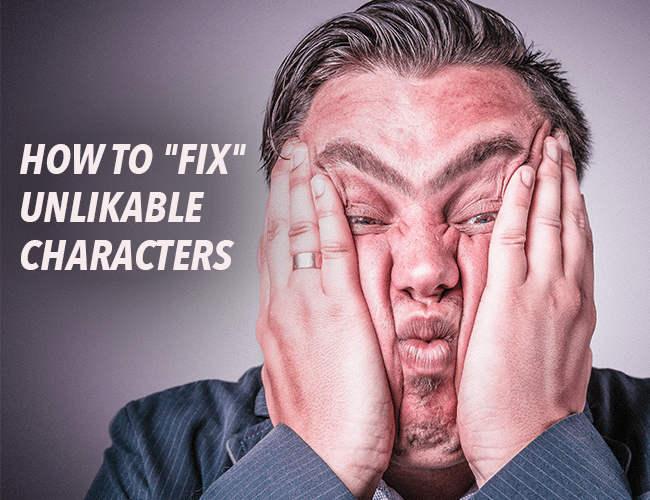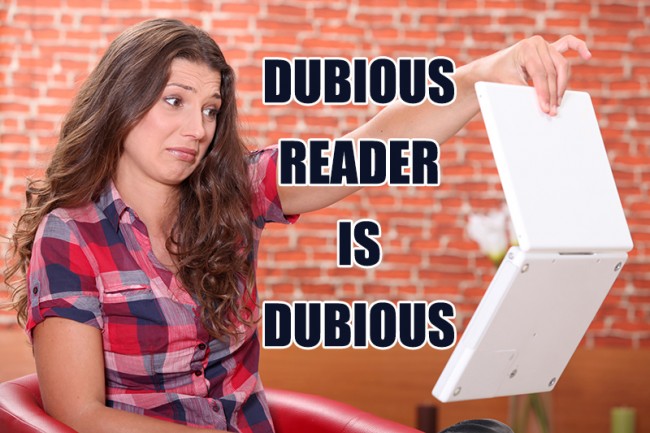Hello, fellow writers! I'm under the weather this week, so today's post will be short, but important.
Here's the deal: if you don't like your character, your reader won't, either. Fortunately, I have three quick tips that will fix that unlikable character.

Sometimes, you write characters you just don't like. It happens to all of us; they can be bad guys, or good guys with problems, or just into things you don't appreciate.
The problem is, when you don't like your character, that dislike seeps into your writing. Your readers will pick up on it, even subconsciously, and it leaves them unable to emotionally engage with that character.

If your readers don't like your character at least a little, then they won't care what happens to that character in the story. If your readers don't care about the character, you've already lost them.
Fortunately, there's a way out. Three ways out, in fact.
Tip #1 to Fix an Unlikable Character: Good Moments
Make sure you know your character's full story.
I mean all of it. Full backstory, from family-of-origin to childhood.
Here's why: nobody is 100 percent good, bad, or ugly. All people have beautiful and terrible tales in their lives, things they regret and things they cherish. Even the most wicked, reprehensible character will have these things.
Sometimes people call this the “save the cat” moment. Even the worst characters on earth don't spend every second of every day being evil; there will be something nice they've done somewhere. If you know the good moments in your character's background, then that will affect the way your character comes across.
Heck, you could even share one or two of those good moments with your reader to deepen your character and add that lovely 3D quality.
Regardless whether you mention it or not, you need to know what those good moments are.
Tip #2 to Fix an Unlikable Character: “I'm Right”
I may have mentioned this before: all characters think they're right. To put it more simply, everybody thinks they're the good guy.
Really. Apart from cartoon people like Doofenshmirtz, no one goes around really believing they're evil. What makes wicked people dangerous is they believe they're right, or at least justified; they believe they have the right (if not the duty) to do the thing they're doing.
You need to know why your character believes they're right.
Even if they're conflicted. Even if they're unsure. There is a reason why that character has chosen the path they have; you need to know that reason, too.
If you can in some way explain (without info-dump, of course) why your character makes those choices, you will be one step closer to your readers getting where that character comes from.
Don't ever underestimate the power of that. Understanding is always the first step toward connection.
Tip #3 to Fix an Unlikable Character: Friendship Time
This one is something of a cheat, to be honest. It's a useful cheat, but a cheat, nevertheless. Having stated that caveat…
It's time to give your unlovable character a friend.
This could be a lover (though that's a little cliché), but it will be much more effective if this individual sees the good qualities in your unlikable character.
This friend gets it; he or she isn't necessarily blind to the problems, but really believes that character is worth saving/helping/working for. Through that friend's eyes, your reader may be able to see why your unlikable character could be likable after all.
Bonus points if that friend doesn't agree with the “cause,” but follows because of faith in that friend.
Do you struggle with an unlikable character? Let us know in the comments.
PRACTICE
Time to practice. Take fifteen minutes and apply one of the three tips to see if you can make that character a little more likable.
Share your work in the the comments below, and don't forget leave some feedback for your fellow writers!
Best-Selling author Ruthanne Reid has led a convention panel on world-building, taught courses on plot and character development, and was keynote speaker for The Write Practice 2021 Spring Retreat.
Author of two series with five books and fifty short stories, Ruthanne has lived in her head since childhood, when she wrote her first story about a pony princess and a genocidal snake-kingdom, using up her mom’s red typewriter ribbon.
When she isn’t reading, writing, or reading about writing, Ruthanne enjoys old cartoons with her husband and two cats, and dreams of living on an island beach far, far away.
P.S. Red is still her favorite color.



Here is some dialogue between the hero and villain of my NaNo book. I think it fits under the good moments category.
“Lilly Heart.” The words passes Cassandra’s lips in a whisper, as though she were speaking more to herself then the killer before her.
“Yes. I assume Damian showed you a picture of me.”
“He did.”
“Good.” Lilly smiled at the ground, “He still keeps his ring doesn’t he? On a string around his neck.” She removed a knife from her belt and began fiddling with it, causing Cassandra to flench. “I still keep mine too.” She raised her right hand and the gray engagement band glinted on it, evidence to her claim. “I’ll never take it off and he’ll never take it off.” She glanced down at the ring, a softness in her eyes, “I do wish we could have gotten married.”
“You could have.”
“No.” All at once her face grew hard and merciless again, “We couldn’t have. Just as a lion can not have a gazelle. No matter how much she loves the creature, she’ll always kill it in the end.”
This is great!
Good tips. And I think that your #2 idea might be the core of it, that it all can come from understanding what he’s *for* rather than just against.
–Your #2 could be that he believes he’s protecting, helping, supporting people (“I steal for my family”) or attitudes about them (“So I steal– we all want to make it in this city, and all of You People won’t let me do anything else”).
–Your #1 is a moment where he’s good to his own people, or to anyone else when his beliefs aren’t getting in the way (or better yet when they put him on the same side as that someone for a moment).
–Your #3 is the other people on his side, or just the ones who see him and appreciate that someone like this has his good side.
I love the Doofensmirtz cartoony reference. That’s the easy way to build a villain, but it’s easy to let many other characters get a little trapped in that; the guy’s really there to complicate the hero’s life, so why bother seeing through his own eyes? It’s no surprise characters like that end up unlikable, if nothing about them truly moves beyond their role as a plot complication.
Nice moments, good goals, and loyal friends. Thanks for the tips.
Very cool! I love your thoughts on this. Thanks so much for the feedback!
Doesn’t it make a difference which character it is? There are always some characters that we enjoy being able to dislike.
Hi, Miriel! 🙂 Well, that’s the thing – there are characters you love to hate, and then there are characters that you just don’t even like reading.
One will keep you in the book, and the other won’t. 🙂
I know this post is old, but I’ve recently been working on a story where the protagonist is unlikable. Here’s an excerpt:
After breakfast, Brooke played a quick game of hide-and-go-seek with Duke.
“I’ll bet you can’t find me!” the little boy yelled as Brooke covered her eyes and started counting.
Brooke smiled. Being around her younger brother made her feel like a fire was burning inside her heart. A few moments later, she opened her eyes and looked around. She immediately spotted Duke standing behind a curtain.
“Found you!” she shouted, walking over and poking Duke’s leg.
He stepped out from behind the curtain, giggling.
“Brooke! Duke! It’s time for school!” their mom’s voice shouted from downstairs.
Brooke sighed. She’d been having so much fun with Duke that she’d almost forgotten that she had to go to school with a bunch of stupid poor kids whose parents probably hadn’t worked a day in their lives.
“Come on, Duke,” she grumbled. They walked down the stairs, Brooke fighting the temptation to curse.